- Home
- David Guterson
The Other Page 4
The Other Read online
Page 4
“I’m going back up the mountain in the morning.”
“Let’s jump,” he pleaded.
“You go ahead.”
“Not without you,” he said.
Looking back, I give him credit for keeping his death wish to himself on Mount Anderson. He didn’t leave me there, and he knew what to do. This was before internal-frame packs were widely used, but John William had one, and on Mount Anderson he removed its aluminum stays, which could be bent to conform to the backs of different climbers, and with them we excavated ice blocks. We worked up a sweat while, in the northwest, the last light played out across the high country. I’m not going to call what we built an igloo, but it did have an igloo’s curve, and, rudimentary as it was, we passed the night in it, sitting on our packs, smoking hash, and eating candy bars by candlelight, laughing but cotton-mouthed, heating the place ourselves until the sidewall nearest John William’s candle began to drip into a water bottle. This is vivid to me still. We drew on that pipe until the drip of melting snow was more than just interesting—it and the candle flame, both so elemental, became deep entertainments, and not just edifying but revelatory icons. I carried a journal in those days, and that night, when John William saw me scribbling in it by candlelight, taking notes on “the blue concave sheen of our icehouse,” for example, he said he couldn’t think of anything better than being a writer, but I’d also heard him say otherwise when I pulled out that journal or reminded him, in some fashion, that I wanted to publish one day. “Lackey,” he would say, about half sardonically. “Fame and money for prostituting your soul. Minister of Information for the master class.” But not tonight. Tonight he sat back in his dope-induced acquiescence and quoted Muir from a popular mountaineering poster: “In the gardens and forests of this wonderful moraine one might spend a whole joyful life.” And Robinson Jeffers, whom he’d read with Althea: “When the cities lie at the monster’s feet there are left the mountains.” I took my notes while he passed into reverie, then crawled through the low entry John William had crafted and, outside to piss at ten degrees, saw not only constellations but the wheel of the Milky Way—the lit disk of our galaxy—harbingers of the clear morning I desired.
SINCE THOSE DAYS, I’ve become a trail hiker, someone who takes no chances in the woods but goes to them frequently, in all weathers. I walk with my wife sometimes, or with my sons or with a friend, but mostly I walk by myself. It’s admittedly a questionable hobby, this putting one foot in front of the other for long hours—questionable enough that sometimes, while walking, I can’t quite endorse or justify my wish to put these miles between myself and others. Why do it when I could do something else? Why this intentional and self-imposed loneliness? “So might I, standing on this pleasant lea, / Have glimpses that would make me less forlorn,” wrote Wordsworth, which is something I know because I teach him. Yet in one of my classes—Nature in Literature—I’m prone to overstating, in small fits of passion, a parallel reinforced by my own experience: that poetry and nature are occasions for introspection, but not necessarily for happiness.
As a teen-ager, I never traveled by myself in the woods or mountains. I went with John William. What we liked best was to walk where there were no roads or trails for as many days as possible, or to walk in country little visited and unmentioned in guidebooks, like the drainage of Depot Creek, northeast of Mount Redoubt, or the valley of Luna Creek on the north side of the Picket Range—those were the places we sought. A lot of hikers like off-trail travel where they can see across open slopes into the distance, but our preference was for forests without spacious views, for “the deep and gloomy wood” that made Wordsworth mushy above Tintern Abbey. I followed John William into this terrain—I followed him because he wanted to go—and gradually I came to like dark forests, too, forests no one went to because, in essence, nothing was there, no lake to camp at or mountain to climb, just trees and a lot of them, so that wherever you went it looked like all the rest: woods in all directions in an unbroken density, and no points of reference. A premium is placed on orienteering where the grid of things is all the same, so my journals from that era are full of terse waypoints we could follow in reverse, though the objects I listed had little to distinguish them—“pecker damaged snag (216),” “rootwad (221),” etc. It wasn’t exactly my calling to navigate, but from anxiety I navigated anyway until it became a pleasure, this sort of knowing where I was at all times, to a fault and neurotically. I didn’t want to be lost, and rigorously took bearings at every turn, never losing sight of what was behind us without noting something abreast or just ahead—though in the end I did get lost, along with John William and a boy named Pete Jenkins.
To really understand “lost” in this context, you have to understand the North Cascades, which in ’73 was the largest roadless wilderness in the lower forty-eight—and not even that gets to the sense of being lost there, since the border between the U.S. and Canada is meaningless to anybody wandering without a map in this region. You have to throw in the contiguous roadless area in Canada, too, and then the wilderness of our confusion jumps from 3 million to 8.5 million acres, or 13,281 square miles, which is about like Massachusetts and Connecticut put together, or larger than Belgium. Granted, some of that was above timberline, but a region as large as New Jersey was “primeval American forest,” a terrain that by ’73 had become, for the most part, a history-class concept, even though it wasn’t all gone yet.
Now I’m in my garret—my older son’s former bedroom—with a map out as a goad to memory. It’s a U.S. Geographical Survey Map prepared by the Army Map Service, in ’55, so there’s no North Cascades Highway and no North Cascades National Park; the place we got lost in was then called the “North Cascade Primitive Area,” which means no one knew much about it; that’s why we went there. We also went because of Pete Jenkins’ interest in getting into the country Kerouac had celebrated from his fire lookout on Desolation Peak during the summer of ’56—Pete, the Lakeside linebacker who liked the Beats; Pete, who appeared to have footballs in his calves as I walked behind him in the woods up there; Pete, who read Kerouac’s Desolation Angels three times during our escapade while tightly cinched in his sleeping bag. Pete’s father had been to Everest as an expedition physician, and Pete himself had climbed, with his dad, his uncle, and a mountaineering celebrity whose name I forget, in the Himalayas and Patagonia. Like John William, he couldn’t quite arrange enough personal disarray to dispel his birthright, and, like John William, he had with him good gear and that air of intrepidness certain upper-class adventurers bring to the woods. To me he looked like Jethro from The Beverly Hillbillies—if Jethro had been born into wealth—with the same more than slightly gullible expression and the same good shoulders. When we rested, he sat with his hands behind his head and his legs crossed, like a big rube on a picnic, and tried to drum up a conversation. For example, he wanted to know about “Roosevelt girls.” He wanted me to sum them up for him. Or he sat with a chunk of rock in his hand and delivered a geology lecture. I didn’t know what a liverwort was until Pete explained it, and I didn’t know rock tripe. I’d also never heard anyone use the word “stamen” until Pete did. On our first day out, he told me, covertly, that at Lakeside the consensus was that “JB,” as he called John William, was “a complete asshole.” Pete had the sort of humor and intelligence that homed in on the logic of language, and so he couldn’t help adding, “As opposed to a partial sphincter.” Like John William, and like me, he was on his own—his parents were divorced, and his father, that summer, was climbing in the Caucasus, which was “far more accessible to the West now,” Pete told us, “because of détente.”
Our plan was simple. We were going to stay off trails for two weeks, penetrating wilderness northward for seven days before following carefully kept waypoints back, but instead—blame me—my waypoints stopped making sense under the influence of marijuana and, as we found out on day eight, backtracking was impossible. One minute my orienteering notes made sense, the next they bore no relatio
nship to the landscape, as if while our backs were turned things moved. I remember us sitting on our packs and laughing about this. We were lost, so it was time to smoke reefer. Pete said I should be “summarily shot for a failure of duty” and then got a map out and started turning it in circles. He took over, and we lost track of things completely. Time, once again, for dope.
Devils Park, Devils Pass, Devils Dome, Devil’s Staircase, Joker Mountain, Hell’s Basin, Nightmare Camp, Freeze-Out Peak—there’d obviously been a lot of desolation in that region, desolation and mental-health crises in those recent days of yore, when landmarks were named by starving surveyors and prospectors with syphilis. Again, no claims to symbolism, but it does seem at least close to appropriate that John William, Pete Jenkins, and I got lost in the vicinity of Three Fools Creek—evident now as I look down on the contours of my map, though at the time we all gauged it 50–50 as to which country we were in, the U.S. or Canada. Imagine such limbo, international in scope and vastly suffocating. There’s nothing to compare it to except maybe amnesia, because, no matter where we went, we didn’t know where we were—we could right now be in the same place we were yesterday and not guess that, or we could guess it without our guessing mattering. After a few days in this situation, you can come unmoored without knowing it. A man astray for five days in Colorado was found wearing only his wristwatch, for example. How do you explain that? But I know the feeling. When your mind has no reference points, it can’t bounce off anything, and then it stops knowing where its borders are. That’s when you start bending your map to make it fit inside your head, or smash your compass with a rock because it’s lying to you. So there we were in our claustrophobic wood, needles in our hair, sweaty and rank, hunkered in the gloom, bug-addled, parched, trying to fix our position by sun bearings where there was no sun, taking resections with no landmarks, and dead reckoning from no starting place except where we were—in short, orienteering in a void of sheer relativism: a little like the math question asking What is x? when nothing is known. The ancient sailors with their astrolabes, on seas no human eye had seen before, at least had the North Star, but what did we have where we were? In our matrix of trees, under shrouded skies? In this world of bark, bad light, and silence? This territory of thick brush and steep ravines? We kept spinning our map around and rereading its contours, but so what? There was no way to make its symbols correspond to the world. Always this pattern—the three of us huddled over our map and deliberating on emptiness, then coming up empty. Was there something, somewhere, we could anchor to? The answer was no for a week.
I’m making it sound bad, like derangement. Actually, our being lost was in some ways a lark, if you subtract my private panic in that forest of no return, our days of painful hunger, our battle with heavy rain, and our running out of dope on our third day in limbo, when we nose-toked the last roaches in Pete’s snuff tin. (It was just as well, our dopelessness, because stoned we’d scarfed all our food.) That evening, potless and tent-bound, we boiled some greens John William thought were edible, then passed the night bent double and convulsed. But the next afternoon, having chanced on a beaver pond, we hand-caught red-legged frogs, which we skinned, skewered, and cooked over flames—two of them, about two inches each—and that was what we ate that day, other than a few beetle larvae from under the bark of a snag (we’d followed the hammering of a woodpecker to them, on the assumption it wasn’t hammering for nothing). In the morning, we saw fingerling trout in a creek pool but couldn’t catch any, though we tried with twine and a safety pin festooned, Pete thought laughably, with a poisonous baneberry, which John William said resembled a salmon egg. I took a turn, swearing at these fish no more than an inch in length for not taking my bait, and, finally consummately frustrated, I tried to grab one from the water with a bare hand. No food that day, other than a few unripened kinnikinnick fruits bitterly chewed in passing.
By the midpoint of our limbo—by our third day of being lost—our hunger was constant and all-consuming. We spent our waking hours addressing it, or, if not addressing it, aware of it, and still we got hungrier, until everything seemed potentially food, even the inner surface of tree bark, which I scraped toward my palate on the edges of my incisors. We bickered about what was edible or inedible. We began, in earnest, to blame each other. “Fricking JB,” Pete muttered to me. “I should have known better.”
Later, we ate raw glacier-lily leaves, grazing for them like mountain goats; they gave us all the runs again and made us freshly leery of greens, but still we foraged, because we had no choice, and got thinner. Hunger made us shrewdly primitive. A gray jay lit on a nearby branch, and after Pete suckered it in with pieces of Desolation Angels’ end page torn and crumpled to resemble bread crumbs, John William trapped it under a tossed parka. There was a little bit of breast meat, which we cut out and savored, but everything else, feathers and all, we brought to a boil that made us impatient—all three of us lowered our faces to the high smell of that small bird percolating. It was fatless, so the broth was thin; nevertheless, we felt some vindication as we tore its paltry carcass apart and sucked its sweetmeats. Girded by the taste of blood, we next did battle with a restless ground squirrel, whose manic spirals over fir bark we noted while traversing a ridge; down it went after our strategy of a pincer proved effective—we moved in on it, each with his rock, and, letting fly while it scrambled and made defiant noises, snuffed it by virtue of Pete’s good aim. This animal, too, went into our pot, skinned and gutted, whole but for the strips of meat we skewered and broiled in flames.
A rain close to snow, sleety, pebblelike, fell unremittingly one full night and day. We holed up and took turns reading Desolation Angels, and poring over a manual John William carried in his pack called Outdoor Survival—really a pamphlet, with diagrams of fishhooks improvised from thorns, clever snares, snow goggles crafted from strips of wood in which slits had been cut, the northern sky at night, etc.; these rough drawings were coupled with commentary on survival and with the divulging of lore. Being hungry hurt, but if you didn’t move around too much you could take it. We sat around, tent-bound and morose. It was during this torpor that Pete openly rebelled—“JB,” he said, “say more about gnosticism. You haven’t bored us for a while.”
“Okay,” John William answered. “You have a piece missing, Pete. According to the Gnostics. Something’s not right, but you don’t notice.”
“Right,” Pete said.
They squabbled until it got old, and then—tent silence. Our languishing and reading were hypnotic but boring—comparatively warm, dulled by hunger, I heard the call of hibernation, though it was also necessary to take turns gathering firewood, keeping enough on hand at all times so that some was always drying by the flames. In our womb of nylon, we cut cedar shavings with Swiss Army knives, fluffy firestarter we slept with so as to warm and dry it overnight—all this so we could heat our boots beneath the tarp lean-to we’d raised and boil what we were throwing in our pot, from watercress to the hedgehog mushrooms Pete said were edible (he was right).
Dire as things were the next day—us with the runs, wet beneath our clothes, and hunting grubs and night crawlers as we stumbled through the forest—we could always count on being resilient, favorably dumb, and braced by the optimism of teen-age hubris. We traveled north—and were turned aside from our zero compass heading daily by cliffs—on the hunch that the southmost road in Canada was closer than the northmost road in the United States, and one night we heard wolves, since this was before wolves ceased to haunt that region—a howling more like the slow, simultaneous closing of rusty screen doors than anything else, and from so far off we couldn’t be sure it was wolves until the wind died down enough to halt the stirring trees and our fire stopped hissing. Even then we didn’t know what it was for sure, but what else could it be, because what else sounds like that? At 2 a.m.? In the “North Cascades Primitive Area”? All sound in the woods is disorienting and confusing, but this sound was clear enough, eventually, to be chilling. Tent flap open, ea
rs pricked, I thought that distant howling through, and it was a very short stretch from my own mean hunger to the perpetual, rapacious drive of wolves—but in the end we never saw any, though we did once get downwind of a black bear who, busy with an ant nest, treed itself at our approach. All three of us yearned to eat this bear, but none of us knew how to slay it. It must have discerned our shortcomings in this department, because when we dropped our packs and knelt to eat ants it scrabbled down, and we left, fecklessly.
On our fourteenth day, in light rain, we re-emerged with no fanfare south of Hope, British Columbia. You can imagine our reaction to the four drivers who ignored our thumbs; for the fifth, we stood mid-road like highwaymen and explained ourselves. Though there was sympathy in that car despite our rankness, we were nevertheless dumped at the first service station, where we sat on a concrete apron beside the gas pumps slamming cheese and chocolate milk, and feeling grateful to the cashier who took pity on us by accepting American coins against her boss’s dictum (we were eating before her till opened, that was a big part of it) but not without a handkerchief across her nostrils. After a journey like ours, people in the “real” world seem misguided and innocent of reality, and this was true not only of the travelers I saw pumping liters of fossil fuel but of everyone around me for a week or more afterward; and even well after a week, there was a residue of this lonely and acute perception of the organized social world as a pathetic illusion, and moments of re-embracing that perception in much of its original intensity (this happened to me while watching diners through the window of a restaurant one night in the University District, where I’d gone to meet cousins at a tavern that didn’t card). Yet, when my blisters had healed, and I’d eaten myself, once more, into arrogance, I happily recovered my old manner of being, though not without adding what I thought was a new layer of wisdom, and not without talking about those woods so much they palled at the same rate at which words about them formed in my mouth. I mangled and then annihilated our whole passage through the North Cascades by engaging in braggadocio about it for hammer-swinging Countrymans, and my sensation of loss was immediate and visceral and left me wistful for what I’d had before. When I mentioned this to John William a month after our deliverance, he said he knew what I was talking about because he’d tainted our journey in something of the same way by writing about it at school. Then he asked me if I wanted to go on another expedition, under similar circumstances, immediately after graduating, this time without a map or matches, relying instead on memorizing our path and making use of a flint and steel. I said yes. Pete Jenkins declined.

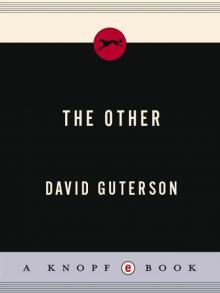 The Other
The Other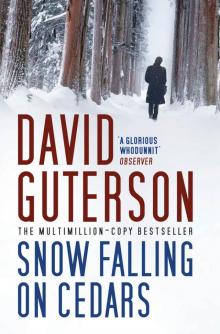 Snow Falling on Cedars
Snow Falling on Cedars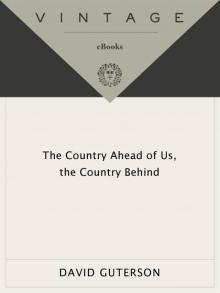 The Country Ahead of Us, the Country Behind
The Country Ahead of Us, the Country Behind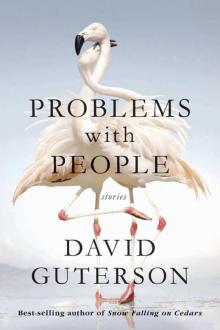 Problems With People: Stories
Problems With People: Stories East of the Mountains
East of the Mountains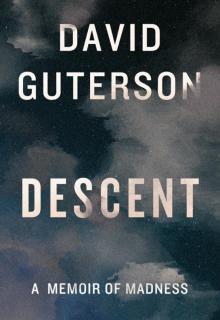 Descent: A Memoir of Madness
Descent: A Memoir of Madness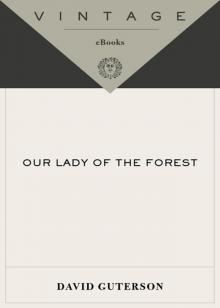 Our Lady of the Forest
Our Lady of the Forest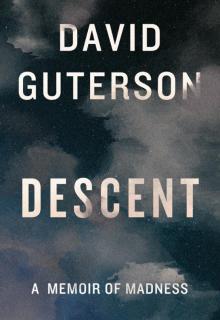 Descent
Descent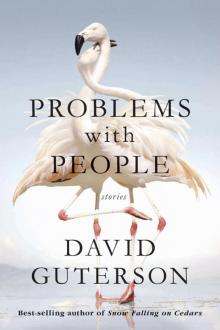 Problems with People
Problems with People